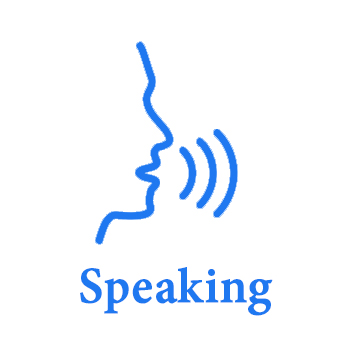ielts speaking
The IELTS (International English Language Testing System) Speaking test is one of the four sections of the IELTS exam. It assesses your speaking skills in English. Here’s some information about the IELTS Speaking test:
-
Format: The IELTS Speaking test is conducted as a face-to-face interview with an examiner. It is divided into three parts and lasts for approximately 11-14 minutes.
-
Part 1: Introduction and Interview (4-5 minutes)
- The examiner introduces themselves and asks you to introduce yourself.
- You’ll be asked general questions about yourself, your work/studies, hobbies, interests, etc.
- This part aims to put you at ease and assess your ability to provide personal information and engage in a conversation.
-
Part 2: Individual Long Turn (3-4 minutes)
- You’ll be given a cue card with a topic and will have one minute to prepare your response.
- You need to speak on the topic for 1-2 minutes, providing relevant information, examples, and supporting details.
- After your speech, the examiner may ask you follow-up questions related to the topic.
-
Part 3: Discussion (4-5 minutes)
- This part involves a more in-depth discussion on the topic from Part 2.
- The examiner will ask you questions related to the topic to explore your ability to express and justify opinions, discuss abstract ideas, and analyze the topic further.
-
Assessment Criteria: Your speaking performance is evaluated based on four main criteria:
-
Fluency and Coherence: This criterion assesses how fluently and coherently you can express your ideas, use appropriate linking words, and maintain a natural flow of speech.
-
Lexical Resource: This criterion evaluates your vocabulary range, the ability to use words and phrases accurately, and the use of idiomatic expressions to convey meaning effectively.
-
Grammatical Range and Accuracy: This criterion assesses your control over grammar, including accurate use of verb tenses, sentence structure, and the ability to avoid frequent errors.
-
Pronunciation: This criterion measures the clarity and intelligibility of your pronunciation, including correct pronunciation of sounds, stress, and intonation patterns.
-
-
Strategies: To perform well in the IELTS Speaking test, consider the following strategies:
-
Practice speaking English regularly to improve fluency and confidence.
-
Familiarize yourself with various topics and practice expressing your thoughts on them.
-
Pay attention to pronunciation and work on clear and accurate pronunciation of words and sounds.
-
Practice giving structured responses with relevant examples and details.
-
Listen carefully to the examiner’s questions and answer them directly and comprehensively.
-
Engage in the discussion by expressing opinions, providing explanations, and supporting your ideas with examples.
-
The IELTS Speaking test aims to assess your ability to communicate effectively in English, so it’s important to practice speaking in English as much as possible and seek feedback from native English speakers or experienced instructors to improve your speaking skills and performance on the IELTS exam.




